Steven Lyle Jordan's Blog, page 56
October 27, 2013
Slaves of the Internet: Get paid
 A recent New York Times article, brought to my attention by editor Neil Marr, describes the impact on the author, and of writers in general, of the present internet-inspired activity of asking writers for content with no expectation of compensation. Usually, the people asking will state that the writer will gain in intangibles like “eyeballs,” people who will read their material, clicks to their pages, media stats that will rack up by their name… and that this is far more valuable than filthy things like money.
A recent New York Times article, brought to my attention by editor Neil Marr, describes the impact on the author, and of writers in general, of the present internet-inspired activity of asking writers for content with no expectation of compensation. Usually, the people asking will state that the writer will gain in intangibles like “eyeballs,” people who will read their material, clicks to their pages, media stats that will rack up by their name… and that this is far more valuable than filthy things like money.
The author, Tim Kreider—and I—respectfully disagree with that sentiment.
This unfortunate trope was inspired and promoted by the young and full-of-piss members of the Internet generation, empowered by the newly-discovered web, and impressed by the ability to share information worldwide, at little effort and less cost. The Information Should Be Free! movement is a direct result of their desire to break down the barriers separating people from knowledge, and make sure everyone has access to everything… a wonderful anarchist utopia for all.
The idea only has one problem: All that information has to be collected or produced by someone… and that someone generally has to eat. We have a world that revolves around the concept that every living being upon it has to eat, and has to expend energy in order to do so. Eating doesn’t come free. Humans, in particular, live in a society designed around the concept of people doing specialized tasks for others, in order for those others to live free of the tasks they do not want to do, so they can concentrate their efforts on the things they do want to do, are (hopefully) good at, and can hopefully offer in turn to others who cannot do that task as well.
We have a system in place to manage the transfer of such efforts from person to person: It’s called money. When a butcher prepares a steak for you, for instance, you pay the butcher to give you the steak. When you want your streets to be lit at night, you pay the government a fee (aka tax) to keep the lights on and maintained. Society has maintained this system for thousands of years now, and by and large, it’s understandable and works pretty well.
Yet there are some tasks which are not seen by many to be workable in this system… in this case, writing. Writing is not the same as butchering a piece of meat, or maintaining a lightpost; it is considered a form of art, which, by definition, is assumed to be disconnected from the typical concepts of cost and benefit. And since art does not adhere to the standards of cost and benefit that other tasks follow, many have decided that it should be divorced from those concepts altogether… that art should cost nothing.
And the rendering of art to electronic media seems to reinforce that suggestion, since we have no established way to pay for “electrons,” web shorthand for the digital files that zip back and forth on our wires, are duplicated with virtually no effort and are stored in multiple iterations in potentially thousands of places at once. Electronic media is said to have no value, because they are not physical entities like steaks or lightposts, and because they can be replicated infinitely with a practically zero expenditure of energy.
All of which ignores one very important fact: A person still had to create the stuff.
There are two consequences to a creator being told their creations are worthless. One, as the author points out, is the suggestion that creators create for no compensation… that they should work on a piece of art, and then hand it over without getting a dime for their efforts. This makes it very hard for that writer to go to the butcher and pay for a steak, or to give the government his taxes to keep the lightposts lit, since they were not given the very compensation society decreed they should get for their efforts on society’s behalf. People who can’t pay for things tend to go hungry, lose their homes, and sometimes, go to jail.
But the other consequence is far worse for the artist. As Kreider states:
“Practicalities aside, money is also how our culture defines value, and being told that what you do is of no ($0.00) value to the society you live in is, frankly, demoralizing. Even sort of insulting. And of course when you live in a culture that treats your work as frivolous you can’t help but internalize some of that devaluation and think of yourself as something less than a bona fide grown-up.”
Being told your efforts are worthless has a psychological impact. Kreider puts a logical face on it, but it’s clear that it has had an impact on him. As a writer, whose work is often suggested to be of no value, and which has turned up on pirate sites or encouraged to be shared on web forums, I can attest to the psychological impact it’s had on me.
People still seem to look sideways at me when I admit to displeasure at being considered some kind of artistic leper because I actually want to see a profit from my work… or when I express the intention to give up writing if I can’t figure out how to promote my work and get paid. If I was a butcher or a lightpost maintenance technician, I wouldn’t be expected to work for nothing, nor would I be looked at as if I was crazy if I asked for compensation for my efforts. But because I’m an artist, I’m not given that same level of civil respect. Demoralizing? Devaluing? Insulted? With bacon on it.
Kreider states that as long as artists agree to give their work away for free, others will continue to expect all artists to give their work away for free… just as crude boys continue to try to pick up girls by insulting them, because every so often, it actually works. Therefore, all artists should unite behind an expectation of being directly compensated for their work, and a refusal to give it away for free. Only in this way will we make clear to others that we deserve the same respect that any butcher or maintenance man gets in being paid for our effort.
Kreider’s opinion piece suggests that those who are asked to create for nothing should respectfully decline, and remind those who ask that their work does have a measurable, practical value. I’d go a step farther and remind those people that you, too, are required to eat, pay rent and pay taxes, just as they do; and that free work with no compensation is something you, as a member of an orderly society, cannot afford.


October 25, 2013
A Worldview via balloon
 World View Enterprises, a Tucson, Arizona start-up, has gotten FAA approval for a revolutionary experience, riding 19 miles into the stratosphere and getting a spectacular view of the planet… by balloon.
World View Enterprises, a Tucson, Arizona start-up, has gotten FAA approval for a revolutionary experience, riding 19 miles into the stratosphere and getting a spectacular view of the planet… by balloon.
Which may not sound like much to most jaded humans, until you remember that a commercial airliner generally flies no more than one mile high. Mount Everest, the highest point on the planet, is about 5.5 miles high. You’re still in atmosphere, and it’s not quite considered orbit (officially designated as being 100 km or 62 miles high)… but for the view, I’d say it’s frackin’ close enough.
The concept is simple enough: A very large helium balloon lifts a capsule of two crew and up to six passengers to a target of 19 miles. After four hours in flight (including two hours at maximum altitude), the balloon detaches, and the crew control an aerofoil parachute to land the capsule at a designated landing area. (See a video of the proposed flight.)
There are two downsides to this venture: One, the loss of helium in the balloon, once it is detached. Helium, we’ve finally realized, is a dwindling resource that we really can’t replenish in any reasonable method, and eventually, even this use would probably be banned as too wasteful. And Two, though you’ve gone very high, you haven’t reached actual space.
(Oh, maybe three downsides: You’re up there with a two-man flight crew, so you may be inhibited from certain more intimate activities while you’re up there (translation: No opportunities to join the 19-Mile-High club… unless maybe you want to invite the crew over and make it a four-way).
But at a cost of $75,000—as opposed to the projected $250,000 cost of a rocket flight on Space Ship One—wealthy-but-not-stinkin’-rich tourists may consider the trip to be worth it. (Actually, the bulk of the flight cost is paying for the helium.) I’m pretty sure you’d be high enough up to clearly see the curvature of the Earth, and therefore, a clear impression of our planet being a very finite body in a practically infinite universe… something I think a lot of people in this world should see.
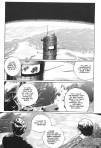 Years ago, I read Yukinobu Hoshino’s graphic novel 2001 Nights, and was very impressed by the very first story in it; in which the U.S. President and the Soviet Premier took a secret trip into orbit, so they could see the Earth from orbit. In so doing, they were as impressed by Spaceship Earth as every astronaut who’s ever flown into space. They fully understood the need to break off any warring tendencies and begin to work together, for the sake of the planet and everyone upon it.
Years ago, I read Yukinobu Hoshino’s graphic novel 2001 Nights, and was very impressed by the very first story in it; in which the U.S. President and the Soviet Premier took a secret trip into orbit, so they could see the Earth from orbit. In so doing, they were as impressed by Spaceship Earth as every astronaut who’s ever flown into space. They fully understood the need to break off any warring tendencies and begin to work together, for the sake of the planet and everyone upon it.
I can think of quite a few politicians who should take that trip. And any number of corporate executives who should be on the next series of flights. I’d even go so far as to suggest that, when such trips become more commonplace, they should become mandatory for every cabinet-level official to take before they begin a single day on the job.
Anyone and everyone whose position can have a significant impact on a major portion of our ecosphere needs the proper perspective of the situation; and now that we’re finally in a position to be able to present it to them, we should. And as we rapidly approach the point at which it will be impossible for us to reverse the warming trend and environmental damage that we, ourselves, have caused, the sooner we can impress that perspective on all government and corporate officials, the better.


October 22, 2013
My confession
This is kind of hard for me, because I’ve been trying to hide this for so long. I never felt fully comfortable in admitting it to anyone, for fear of the way people would look at me… judge me. I can tell that the few people in my life who do know about it don’t look at me in the same way they used to. I’ve tried to keep it to myself, afraid of how it would affect my job, or drive away my friends.
However, I believe I’ve reached a point in my life where I can no longer deny my nature. And I am willing to stand up to the judgement of my friends, relatives and colleagues, free of shame or remorse.
I am an artisan author.
Oh, God… you have no idea how just saying that has lifted an incredible weight off my shoulders… one I’ve been carrying around for so long. But you probably want to know how I came to be this way; so let me see how well I can explain myself.
First off, there was nothing unusual in my upbringing. Honest. Two loving parents, toys, good meals… all of that. But I think my neighborhood was greatly to blame for how I turned out. We lived in Montgomery County, Maryland… I don’t know if they’ve managed to change, but at the time, they had what was considered one of the greatest public school systems in the country. If not the greatest. And for good or bad, I was smack-dab in the middle of it.
Surely the most pervasive part of my education was the development of my English and writing skills; I was drilled on them constantly, relentlessly, until they became second nature to me. I was forced to apply those skills in many other disciplines as well, using writing to answer questions, to write reports and essays… it never stopped. Soon, I was able to talk in my sleep.
At the same time, I often found myself seeking refuge from all the writing, by secluding myself and trying to imagine myself in some far off land, or in the future, having adventures and probing the secrets and possibilities of science. I’d discovered at a young age that there were manuals to help you imagine these worlds and their characters… I didn’t know it at the time, but I learned later that I was reading “books.” Books became my escape from the rigors of English lessons… and soon I found I couldn’t resist them. I began to read all I could, especially in the area of science fiction… though I was always wary of admitting this to anyone, as even then, I was aware of the discrimination and shame often visited upon other science fiction addicts.
I finally found my way out of Montgomery County’s school system and graduated with a 3.8 average (which meant something back then… today, evidently not so much). I was clearly marked by then… you could hear it in my voice, or see it in anything I wrote.
My addiction to science fiction books continued unabated; I was helpless to stop… and I confess, at the time I didn’t want to. When I started having trouble finding new novels to read, my restless mind found itself staring at empty sheets of paper. Before I knew it, those habits that had been burned into my being so long ago took control of me, and I began writing my own stories. Even the books I’d read impacted me, as I’d apparently discovered a lot about assembling stories by reading the stories of others. Ideas, bottles up inside me for decades, just started pouring out, and the only way I could excise them was to put them down on paper.
It was easy.
It didn’t take long before I moved up from pen and paper to computers. How could I resist? They made the writing so much better, with their spell checks and editing tools. I started writing all the time… neglecting things like television, illustration (yes, I’d dabbled in it in school… another bad habit that, as it happens, I finally grew out of when the writing pushed it out of my life) and even girls. I was spiraling out of control. I was becoming an artisan.
Yes, I’d heard the word applied to people like me. It was a weird badge of pseudo-honor, something the so-called artisans were proud to proclaim… but everyone else just sneered at. It was a PC-based insult, like calling alcoholism a disease; ultimately, only those suffering from it wanted to believe it wasn’t their fault, because everyone else was convinced otherwise. Laughing at the poor deluded souls, nodding to their faces, oh, yes, you’re an artisan… then turning their backs and calling them hacks to everyone else.
But I didn’t know about all that, because I was too isolated from those who could have intervened. I was content to write on my own, with no one to examine my work or tell me what to change to make it better here, or better there. What’s worse, those few who did see what I was doing only encouraged me, giving me regular and consistent 4- and 5-star reviews for my writing. Even now, my so-called “peers” rate all my work highly, and never—ever—suggest that I need to see someone, be it a proofreader, or God forbid, an editor, to help me see reason.
And so I’ve written, and when people around me discussed the essential need for every writer to have an editor to straighten them out… I’ve stayed silent, hoping no one would realize that I had no editor of my own. And I’ve managed to struggle on without anyone’s assistance. Sure, it’s been tough… don’t let anyone tell you that editing your own work is easy… and thank God I already had experience with Photoshop and HTML, it came in handy when I found myself in need of websites and book covers.
But I’ve come to realize that at least I can stand on my own two feet; I don’t feel like I need to blame anyone for what I’ve done. I am solely responsible for my actions. I am an artisan. I’ve created novels… my own novels. And I’m good with that. No, they may not be perfect. But they’re me. They’re all me. Take ‘em or leave ‘em.
You know, it’s okay to look at the novels and decide that an editor would’ve done this, or a proofreader might’ve changed that. You can even tell me—to my face, if you want—whatever you think about their shortcomings. But at the end of the day, I can sleep soundly, knowing that I created the best novel I could with the meager resources at my disposal.
And that they aren’t that bad.
Thanks for listening.


October 18, 2013
Considering the future of superheroes
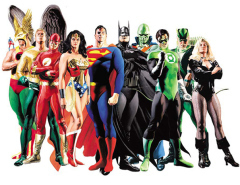 As we approach the midpoint of the second decade of the 21st century, it’s interesting to me that one of the most popular media tropes of the day is that of the superhero, an invention of the 20th century. Movies and television shoes especially have finally reached the stage of special effects artistry to convince us that a man can fly, or transform into another creature, or hit something hard enough to send it into low Earth orbit. But why is it that superheroes have lasted as long as they have… and will they be impacted by the future?
As we approach the midpoint of the second decade of the 21st century, it’s interesting to me that one of the most popular media tropes of the day is that of the superhero, an invention of the 20th century. Movies and television shoes especially have finally reached the stage of special effects artistry to convince us that a man can fly, or transform into another creature, or hit something hard enough to send it into low Earth orbit. But why is it that superheroes have lasted as long as they have… and will they be impacted by the future?
The idea of beings, more powerful than ordinary mortals, who do mighty deeds and help mortals out of tough spots, isn’t a twentieth century trope; it’s only been around since man has wondered how things in this world work. His fertile imagination cooked up spirits, then gods, titans, monsters and other creatures, capable of good and bad behavior and sometimes willing to stand up for men and women who couldn’t help themselves. Always, these beings were gifted with powers and abilities men could not imagine, usually given to them by other gods, or by the energies inherent in nature.
These beings satisfied a psychological need for father figures; that is, someone who could protect us from the worst the world had to offer, things we could not protect ourselves from. Someone we could conceivably call to loudly enough to have our prayers answered. Heroes, more or less modeled after men and women given extraordinary powers, were the modern version of these beings, a sort of extension of our own desires to serve and protect others in an unselfish and altruistic way.
The 20th century was represented by the incredible growth of the field of science, a discipline as mysterious as god and nature to many people. It was also marked by the growing belief that there are other planets out in space, and that they might harbor beings much like us. Science offered a perfect source of inspiration for men transformed by strange and unexpected scientific advancements or accidents, or beings from the many creature-harboring planets suspected to be in our skies. In the DC comics line, Superman, a being from another planet, joined new age heroes like the Flash, victim of a science lab accident; Green Lantern, a man given a powerful ring by omniscient aliens; and Black Canary, a woman from another dimension. Later, Marvel comics gave us Captain America, a man transformed from weakling to champion thanks to an experimental drug; joining forces with Iron Man, a man wearing a technological marvel of a battle suit; Giant Man, who has discovered a formula capable of changing his size; and the Hulk, a man accidentally dosed with Gamma rays until he’d transformed into a barely-coherent monster.
The 20th century found all sorts of ways to apply science to the creation of superheroes, mostly in the form of technological achievements, science accidents, exposure to mysterious radiation or beings from other planets. These origins came primarily from our rather limited understanding of these technologies and areas of science, and we conjured up weird or unexpected effects of those sciences and technologies to satisfy our fears or hopes for what science was capable of.

“Damn… I think I just broke my back.”
But it is now 2013. We know that the likelihood of humanoid aliens on nearby planets, or even planets in other star systems, is incredibly slim. We know that gamma radiation will not strengthen your body, no lab accident is likely to give you incredible speed or the power of invisibility, a hard shell isn’t enough to protect your body from major impacts, and being born of parents who were exposed to atomic radiation during World War II most likely means an increased risk of developing leukemia.
We’ve learned more about science and our world… we’ve grown up. But at the same time, we still have a base desire for beings greater than us, capable of using extraordinary powers to protect us. Will we continue to draw upon the same 20th century notions of the imaginary potentials of science… or will we use notions of new tropes to create our superheroes of the 21st century?
Though we’ve learned a lot about science, we have come to realize that we still have a lot to learn about biology and the limits of physiology, something barely touched upon in the last century. As today’s scientists experiment with DNA and stem cells, the layman sees attempts to improve the human body, to eradicate disease, to quell the need for exercise or the requirement to watch what we eat.
We are also furthering our experiments into synthetic materials that might substitute for or augment human bone, muscle or organs. And we are experimenting with nano-machines that can operate within our bodies, making adjustments to our systems at a cellular level. We may be on the cusp of replacing human body parts with new ones, and installing micro machines that can augment or repair our bodies as needed.
Out of the mystery of what may be possible, comes the seed for future heroes born of advanced biological experiments succeeded (or failed). And as we still don’t have a complete knowledge of the mechanations of DNA and other biological functions, or the limits of technology-augmented biologic systems, we can conceive of men and woman gaining powers and abilities beyond our ken through bio-augmented means.
We’ve also learned a lot—but not enough—about physics, including the possibility of other dimensions, the existence of sub-atomic particles and activity only guessed at fifty years ago, and the strange laws of quantum physics. Our lack of knowledge and understanding leaves us wide open for characters built upon our speculations about the nature of science and physics at the subatomic or other-dimensional level. Access to other-dimensional data or capabilities, possibly sources of energy, or the means to travel from place to place in unique ways, beckon to us.
So, should we expect the superheroes of the 20th century will be replaced by those of the 21st? And what will these 21st century heroes be like? Will they fly via alien ability or technical means… or will they utilize other dimensions to move from New York to Paris in one step? Will they beat up bad guys courtesy of a secret formula… or via graphite-laced bones and synthetic muscles? Will they shoot energy beams from their eyes… or alter the nature of the very physics around him to siphon energy from an attacker? Will they be from other planets… or from private research lab trials?
We are an imaginative people, capable of taking the things we’ve learned and adjusting our world to suit. I can’t imagine that we wouldn’t use our newfound knowledge of science and technology to reinvent our heroes, always with an eye to keeping them a step or two ahead of us. Inventing our own gods to serve our hopes, our fears, our needs. That’s what we do… it’s what we’ve always done. So we can look forward to a new pantheon of superheroes, and it shouldn’t be too long now before they arrive.
The superheroes of the 20th century stood above 19th century characters like Zorro and the Lone Ranger, making the all-too-human vigilantes look like dinosaurs in comparison. In the Alan Moore graphic novel Watchmen, a mild-mannered scientist was transformed into Dr. Manhattan, the first hero with actual superhuman powers, making him unique and groundbreaking amongst men and women with merely human skills and intelligence… the superhero for the new era, who made the others obsolete. The 21st century superheroes may have the same effect upon the heroes of the 20th, standing so far beyond the likes of Superman and Captain America as to make them look as much like dinosaurs as they themselves did to the likes of Zorro.
What will they be like? Can we even imagine?


October 12, 2013
Is Star Trek’s day done?
 The SF world is abuzz about talks to create a new television show set in the Star Trek universe. Nothing is set in stone, so everyone is predictably offering their opinions on what the new series should be like.
The SF world is abuzz about talks to create a new television show set in the Star Trek universe. Nothing is set in stone, so everyone is predictably offering their opinions on what the new series should be like.
Sorry, Trekkers… but I question whether the world needs another Trek series at all.
Here are a few things to consider: First of all, Star Trek was conceived by Gene Roddenberry, an American war veteran and policeman turned TV writer and producer. Gene, in conceiving Star Trek, presented it to TV executives as a “Wagon Train to the stars,” a reference to a popular TV show format wherein a group of people travel unfamiliar lands, helping people (and sometimes themselves) out of trouble along the way. The organization he chose to embark on such a trip was a quasi-military organization, a sort of romantization of the post-war navy. The stories featured adventures in strange lands, or places where strange phenomena required the best and brightest to solve and overcome. The aliens they encountered were very clearly designed to be caricatures of existing foreign peoples, and conflicts with them closely resembled conflicts with certain countries with which Americans were very familiar. And a great deal of the world-building involved a cold-war-esque threat of armageddon with those various other races.
All of which was fine, for the late-twentieth century United States seeking to reconcile their position as world superpower with their own domestic problems, confident in its ability to solve any problem with a judicious use of technology, and hoping to be the country that would lead the world into a future with a decidedly American skew.
Fast-forward to 2013: We are only three years from what will be Star Trek‘s 50th anniversary; and to be blunt, the world has changed quite a bit. The planet and its issues have proven to be much more difficult to solve, and even technology has proven to be not up to the task in many instances. Further, we’ve seen examples where technology causes as many problems as it solves, or meets unexpected resistance due to its impact on the personal, social, financial or political balance of life and power. Technology is not the shining white knight of fifty years ago; it has shown itself to be as often dangerous, corruptible and unpredictable.
Our view of the world’s people has changed, too. The American “melting pot” has pretty much finished simmering, and the domestic issues involved with different races living together is all but gone. On the other hand, lifestyles and preferences have become more of an issue than ever before, and we’ve discovered that many Americans tend to be more isolationist than ever before. Other countries seem much more like America than before, but strangely, America finds itself being simultaneously held up as an ideal place to live and a symbol of everything that’s wrong with the world.
Even the impression of our own industry and organizations has changed significantly. Where once the American work ethic was considered without peer, a recent history of corruption, lies, infighting, crime, misrepresentation and unfair practices has tarnished the reputation of the American organization, whether it be corporate, government, military or public service.
And finally, our knowledge of space and science has grown. The simple assumptions made by Star Trek (or presented due to budgetary limitations) are no longer accepted by scientists, the media or the public. Alien races that all inexplicably speak English, ships that easily travel faster than light, matter replicators, energy weapons and other physics-shattering phenomena are the quaint stuff of the 1900s, but hopelessly dated in the 2010s.
In this light, a fleet of great, infinitely-powerful ships plying the universe landing on new planets every week and sharing universal truths with the humanoid occupants seems ludicrous. Star Trek, a concept born in the 1960s, has effectively lived to see its own obsolescence; we’ve outgrown it, the same way we’ve outgrown Flash Gordon and H.G. Wells’ Martians. Even Gene Roddenberry wouldn’t want us to plant our feet in the mud and refuse to move forward.
Ironically, the recent movies have shown us how much we’ve outgrown Trek. Stories featuring characters who openly defy authority and command structures, technology that looks shiny but incomprehensible to today’s audiences, exploration having given way to course conflict and destruction, character relationships pulled out of prime time soaps, and demonstrations of physics straight out of cartoon reality, represent clear abandonment of what Star Trek represents and strives for. And these movies are proving very popular with audiences, demonstrating that they’re okay with the idea of giving up the ideals of Star Trek for something new.
So I say it’s clearly time to retire Star Trek, and build a science fiction show for today. A show that better represents our world today and our hopes for tomorrow, and our increased knowledge of science and physics. A show that doesn’t have humanoid aliens on every other planet… that doesn’t cross the galaxy in mere minutes… that does more than set up obvious parallels with human international and domestic issues… that shows technology in a realistic light, as tools that help us to do our jobs, that occasionally need coaxing to do so, but are not magic buttons to solve every crisis.
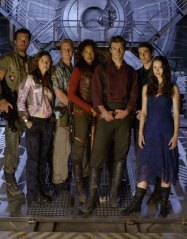 I’ll go ahead and make the suggestion that Firefly is probably much closer to the science fiction show to carry us through the next fifty years of television; a show about humans and pretty much only humans, since we are much less likely to meet and communicate with aliens like us than we previously thought; a show whose boundaries are a lot more human-scale than entire galaxies, and whose physics reflects the things we now know. Another suggestion: Cowboy Bebop, a show that never leaves the solar system, but that built up a wealth of locations and mythology to set stories within.
I’ll go ahead and make the suggestion that Firefly is probably much closer to the science fiction show to carry us through the next fifty years of television; a show about humans and pretty much only humans, since we are much less likely to meet and communicate with aliens like us than we previously thought; a show whose boundaries are a lot more human-scale than entire galaxies, and whose physics reflects the things we now know. Another suggestion: Cowboy Bebop, a show that never leaves the solar system, but that built up a wealth of locations and mythology to set stories within.
Sure, it’s not as fun as Klingons, phasers and mind-melding; but it is more modern, more realistic and more grown-up. And if we do it right, it can be the vision that takes us all the way to the 21st century. I think Mr. Roddenberry would approve.


October 2, 2013
A (backhanded) slap at the concept of “races”
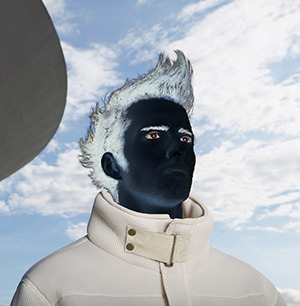
The depiction I used for character Mark O’Bannon in the original cover for The Kestral Voyages: The Lens.
Years ago, for one of my first writing projects (The Onuissance Cells), I decided that I wanted to make a statement about races and nationalities in science fiction. A few years later, I decided I wanted to repeat the statement, and I chose The Kestral Voyages to do that. though neither series was connected, they used the same character type and (approximate) basis. The character types were represented by Commander Thomas Beak in Onuissance, and Mark O’Bannon in Kestral.
In both cases, I postulated a period previous to the story’s time, when corporate researchers had tried to figure out a way to biochemically alter human skin in order to make it more resilient to UV rays. In Onuissance‘s case, the UV rays were reaching the Earth’s surface via the thinning ozone layer; in Kestral, the UV rays were shining down on the first Martian colonists through Mars’ much thinner atmosphere and lack of ozone layer.
The skin alteration gave those who used it jet-black skin and snow-white hair; those people were then commonly referred to as “black.” This came at a time when humans were still referring to various races based on color designations, such as the term “black” being a reference to those of dark-skinned African descent. This impacted the widespread use of color designations to denote racial type, especially as those with “black” skin could now be any racial type at all… and it sounded stupid to say things like, “a black-skinned white man.” Eventually, differences defaulted to more racially- or nationally-accurate designations, or more and more often they weren’t used at all.
But I decided to throw in a catch, borne out of two trends. The first was the growing realization that our modern love affair with the lowly peanut was resulting in unforeseen medical consequences, mainly, widespread allergies to the peanut that were impacting food and manufacturing industries worldwide. Having little to no knowledge of genetics when G.W. Carver began his campaign to introduce peanut-based products to the world, there was no way to guess that humans would eventually have an adverse reaction to the peanut, nor that the trait could be passed down to subsequent generations. A clear example of how much we still have to learn about ourselves and the ecosystem that supports us. The second trend was today’s industrial process of generating new biochemical products, much of which is not thoroughly tested or proven safe, in order to put it into market as fast as possible to earn whatever profit can be had. This has resulted in debilitating and even fatal products, numerous class action suits and a general distrust of the biochem industry and its releases.
And so: Under both scenarios, the fictitious treatment had not been thoroughly tested by the profit-motivated labs and corporations, and was introduced to the public before it had been cleared by regulatory labs and authorities. And though the treatment worked at blocking UV rays, it had a surprising consequence: The elaborate treatment unexpectedly managed to permanently alter the DNA of those who used it, and the alteration was passed down to their progeny. As a result, a new “race” of white-haired black-skinned humans was created, and the process could not be reversed. Those who initially used the untested products were considered gullible and ignorant by those who did not; and this new prejudice was further applied to the children of the subjects for generations, creating a new group of people that others felt they could scorn and ridicule, much as new immigrant groups to American shores were often treated in the 1800s and 1900s.
So, yes: I took away the original objects of the region-centric, or “racial” prejudices of Man, and redirected prejudice at a brand new, visually distinctive “race” that was actually made up of any and every human race; my admittedly backhanded way of saying that “we’re all the same under the skin.” And more: This prejudice was mostly intelligence-based, not region-based, giving rise to the issues of mostly professional discrimination to be overcome by subsequent black generations.
In Onuissance, a series of short stories set only about 250 years in our future, I only touched on the obvious depiction of class struggle inherent in such a character trope; I represented it as a fresh, not altogether settled issue, with a few old-fashioned souls who hadn’t gotten over their prejudices yet, and the ill-will that was generated.
In Kestral, which takes place about 400 years in our future, the issue is completely resolved… especially as humans have gone on to master genetic manipulation and physical variation, and now reconfigure the human genome at will to optimize it to the physical demands of the planets they settle on. In that light, slight variations in skin color or facial structure mean less than nothing against traits like heavier musculature, lighter bone structure, lungs designed to handle a different mixture of air or digestive systems altered to filter out unusual chemicals from a planet’s makeup. Blacks are now considered the same as any other race of humans; which is to say, one of a varied group of physical types that all share a basic human ancestry, but a step beyond the varied physical traits that represent our regional differences today.
Though the racial aspect of this trope is obvious, it’s actually intended as more of a criticism of today’s profit-based industrial system, and its apparent disdain for human safety in pursuit of the almighty dollar. It just so happens that I chose a way to present this that doubles as a commentary on race and race relations. Sort of a two-for-one deal. The racial aspect of this vehicle is largely metaphorical, and simply meant to speak to the readers of today; they are not intended to be prophetic.
What I expect to happen in reality is a continuance of the behavior of the last 3000 years, wherein the human race that had previously spread itself to the far corners of the planet and created all these regional differences, continues to come back together and remix those regional differences. As races mix and regional environments progress toward a more homogenous state, the human race will likely lose most of the overt regional differences that we see and celebrate today, resulting in more standardized physical appearances.
But this regional homogenization will likely take a few more thousand years to accomplish. In the meantime, we can expect to be able to recognize at least some people by the regions from which their ancestors were born; and as long as some of us will continue to ascribe differences to those regional types—whether they mean anything or nothing—we’ll be making it a part of our narratives for some time to come.


September 30, 2013
Review: Mars Girl
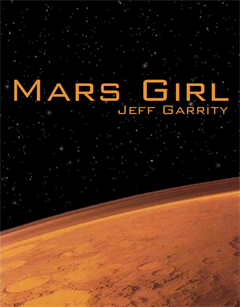 I was introduced to Jeff Garrity’s Mars Girl years ago, when it could be said that the age of independent science fiction authors producing ebooks was still in its pre-Amazon renaissance. In my recent search for more budding Sf authors, whom I hope to see much more of in the future, I came across this book again and decided to give it a second read. I’m so glad I did. (It’s easy for you to read it too, because it’s free.)
I was introduced to Jeff Garrity’s Mars Girl years ago, when it could be said that the age of independent science fiction authors producing ebooks was still in its pre-Amazon renaissance. In my recent search for more budding Sf authors, whom I hope to see much more of in the future, I came across this book again and decided to give it a second read. I’m so glad I did. (It’s easy for you to read it too, because it’s free.)
Mars Girl is that rare breed of science fiction dark satire, mostly a scathing and hilarious look at the future of the media news industry. The story revolves around the big news item of the moment, in this case, a young girl on the first manned mission to Mars; and in the process, the story shows us a news media system addicted to ratings, fighting for commercial dollars, not afraid to stoop to sensationalism and stabbing its own people in the back, and eager to package its news as whatever kind of reality-show drama will win them the eyeballs that night.
Mars Girl starts with the girl, Mirellen Garasovic, as her malfunctioning spacecraft plummets into Mars’ atmosphere, her fate uncertain at the very beginning of the story. From there, the story periodically returns to Mirellen and her struggle for survival, but it’s quickly relegated to background noise as the news media gears up to make a ratings kill out of it. This story is actually about Ray Barker, a nice but somewhat seedy field reporter who is forced to leave a family funeral to be part of the ongoing story of the Mars mission; and in the process, ends up becoming major news himself.
As Barker tries to get the story, and we discover he’s not averse to making things up as he goes, we watch his news bosses match Barker’s mildly-underhanded way of working with underhandedness of their own; this has become standard operating procedure in news, even to the extent of filming him in a private tryst without him knowing, and getting him in hot water with the local authorities and a jealous ex-husband. Soon, the plight of Mars Girl (as the media labels her) is quickly overshadowed by the adventures of Barker and the quirky people he meets in the town of Okinisee. As Barker connives, loves and struggles, it seems even the people he most closely interacts with are watching him more through a TV lens than in person, or missing what’s going on right under their noses as they obsess over the Mars Girl newscasts; it’s like watching a Benny Hill chase scene going on behind the armchairs of the oblivious TV viewers. And just as it looks like Barker may get out by the skin of his teeth, it appears there’s something funny about the Mars landing, and when Barker gets wind of it, suddenly ex-husbands and local cops are the least of his worries.
Garrity does a great job of painting a world “20 minutes into the future,” very similar to ours but also so hyped up on constant news and sensationalist media so as to hold a very large mirror up to our present media cycles. This mirror is clearly showing us a parody of our news media… but as the story continues, it’s easy to find yourself wondering just how much of a parody this is.
Although most of this world is very familiar to the reader, the technology is ahead of us, particularly in the area of communications tech: Reporters and other executives have phones in their heads. Wireless cameras are embedded in contact lenses, and remote-piloted flying drones act as on-the-scene cameras, taking the action right to the people’s living rooms. Televisions and tablet devices are voice-controlled, and many vehicles are electric. And oh, yeah: We can apparently fly people to Mars now; but in the midst of everything else going on, that’s almost unimportant.
I like Garrity’s style, very immediate and chopped into appropriately bite-sized fast-food pieces, much like the bits of television we get between the everpresent commercials. Like the media he satirizes, his text is tight and descriptive, not verbose; his action happens fast and doesn’t dwell on extemporaneous matter. His climax is fast-paced, like the best of television shows, with some delightful twists and turns along the way. His characters are just what the story needs to move the narrative along at a brisk pace. I can easily see this book on TV or in the movies, and I think it would be a huge hit. But whatever the media, it’s a great yarn, and wonderfully told.
Most importantly, Mars Girl stands out as the highest quality literature that many people would have you believe independent authors are incapable of creating, without the help of a battery of editors and a major publishing house: It’s proof-of-concept for the modern independent novel. It’s a great story, meticulously written and as funny as anything you’re going to get from major publishers or bestselling authors. Mars Girl the book is as much a must-read story as Mars Girl is must-see TV.


September 26, 2013
The frustration of Worldfarm One
 When I wrote Worldfarm One, I expected parts of it would be controversial. I was writing about a time in the not-so-far future when the United States was no longer the superpower it once was; and its population was emigrating to other lands for better lives and jobs, only to be looked down upon by the nations they emigrated to. It should not only sound familiar, but it should set off whatever irony alarms the reader has at their disposal. I expected that some people—well, let’s be clear, U.S. citizens—would not be thrilled with the demotion of the United States on the world stage, and that I’d hear about it fairly quickly.
When I wrote Worldfarm One, I expected parts of it would be controversial. I was writing about a time in the not-so-far future when the United States was no longer the superpower it once was; and its population was emigrating to other lands for better lives and jobs, only to be looked down upon by the nations they emigrated to. It should not only sound familiar, but it should set off whatever irony alarms the reader has at their disposal. I expected that some people—well, let’s be clear, U.S. citizens—would not be thrilled with the demotion of the United States on the world stage, and that I’d hear about it fairly quickly.
But owing to the incredible vagaries of life, what I got was almost completely different. And it still boggles my mind, to this day.
I was writing about a main character, Keith Maryland, who not only had had problems in his past life in the United States, but who was trying to start over and turn his life around in Brasil, working for the United Nations in their attempt to run Worldfarms to feed the world. Unfortunately, he finds himself being looked down upon by his new bosses, co-workers and the locals in the nearest town of Manaus, Brasil, because of his being Estados (from the United States). He is treated like a third-class citizen, even to being suspected as colluding with an ex-Estados band of criminals by virtue of his nationality. His boss, a power-hungry woman who thinks nothing of taking advantage of the men who work under her (in every sense of the word), unilaterally adds him to her harem of guys-on-call; and of course, all the ladies with whom he works immediately think less of him for submitting to her attentions, willingly or not. This is a man between a rock and a hard place, trying desperately to dig himself out of the hole others dropped him into.
But did I see any comments about that? No; I saw comments about the fact that he slept with his boss almost immediately upon arriving at Worldfarm One, and slept with a working girl at a town bordello not long afterward. Since I made reference to his being relatively young, good-looking and well-built, my character was described as a “Black Brad Pitt” by one reviewer.
The irony of this—on many levels—didn’t escape me. Besides the fact that no one seemed to be concerned about the obvious racial prejudice directed at Keith, no one commented on the turnabout sexual situation in which he found himself. Of course, it’s been shown in studies that males cannot seem to comprehend the idea of being undesirably sexually dominated, even, sometimes, when it is happening to them; the very idea of a woman in a dominating position controlling them seems to blow the needle off the Ego gauge, and the men seek to find a reason that is less damaging to their psyche. Perhaps this is why reviewers and commenters assumed my character was happily jumping from bed to bed like James Bond on a layover, despite the evidence that he was being forced by his boss, and taking refuge in the bordello from the prejudiced eyes of his fellow employees.
There was even another character in the story to provide a mirror to the main character’s plight: Another ex-Estados, Linda Mazaña, known as “Manzanas” to her co-workers due to her own natural endowments and an unfortunate choice of a “Spanish-sounding” last name by her parents; and often followed around, watched avidly and pestered regularly by the male staff. Despite putting up with the looks and comments, and probably the regular attentions of her superiors, Linda was a smart and capable technician, and had earned the respect of at least some of her colleagues. Apparently not one reader noticed the reflection on Keith’s situation in that mirror.
But then, Americans continue to be “shocked” when they hear news reports of girls being brought to the U.S., ostensibly to work and eventually gain citizenship… only to be literally locked in the homes of their rich employers and forced to work like slaves, often including forcing them into sex and outright prostitution, said exploitation going on for years before the girls escape or someone on the outside realizes something is going on. In some matters, Americans’ mirrors seem to be permanently and even intentionally obscured, a tacit approval of the unofficial American motto: “Do what you want, just don’t get caught.”
Nor did anyone say anything about the idea of a person from a particular nationality being automatically associated with a group of criminals from that same nationality, a revelation to our main character when it happened to him. The criminals were even drug dealers. They are in South America. Irony alert… anybody?
And finally, as opposed to challenging the idea that the United States could lose its position of greatness in the world… readers complained about the idea of the United Nations finally ascending to the position of dominant world government that it was supposed to have been when it was formed. Most of the comments had to do with U.N. corruption or ineptitude, and their complete lack of ability to do anything substantial in the world today, as an indicator of how bad a world government they’d be in the future. in other words, assuming that the U.N. could never improve.
This attitude assumes that the U.N. is not a capable body, which is not true; the U.N. is unfortunately hamstrung by the wills of the world’s present superpowers, The U.S., Russia, China, etc, who have a habit of ignoring U.N. edicts, especially when it is not advantageous to them, and not providing the unilateral support that a global government needs to function. And it assumes that the current state of world power will not change, something we have no reason to assume will be true. Already the United States has lost much of its power and cachet with the rest of the world, and other countries like Russia and China are suffering their own growing pains. As the superpowers wane, it makes sense that the lesser countries may decide to throw their full support into the U.N. and finally build it into the world authority it wants to be. In other words, the U.N. can improve, if the correct political climate prevails… and that climate seems to be building, right now.
Still, with this abounding political and social commentary, how is it that readers only saw the “Black Brad Pitt”? Why were the bed-hopping and the idea of an effective U.N. the only things that registered?
I suspect that Americans still have a lot of blind spots when it comes to national issues, in and outside of their country. There’s a reason why other countries refer to us as “ugly Americans,” as some of us present a very superior and intolerant face towards foreigners… and seemingly forgetting that most of us were born to ancestors who were foreigners to American shores at one time. Many Americans look down upon those who sneak across our borders from the south—and even those who enter our country legally—and take on jobs that Americans don’t want, or don’t qualify for. But they can’t imagine the shoe being on the other foot, and being the one others look down upon.
They especially can’t imagine the United States being anything other than Great. Our national consciousness has been one of perceived superiority for so long that we essentially teach it as a given to our children. Despite global strife, it is assumed by Americans that, now that we’re on top, we’ll stay there. And we generally avert our eyes from the east, and that nation on the other side of the Atlantic that once thought as we did (hint: “The Sun never sets on…”).
And so; ignoring the possibility of the United States’ ever falling from grace, or that its citizens will ever be the darlings of the world, the readers settle on picking on the main character’s sex life.
Well, sometimes stories just work out that way, taking on a life that the writer never expected. Certainly the story is not as powerful as the themes in which I framed them, and maybe that’s the problem: Without a strong enough story, there was no reason to dwell on the deeper meanings surrounding it. Or maybe I just needed to be less subtle about what was going on, and put up nice, big signs for readers to lock onto. So, maybe my mistake.
Or maybe it was just the “thriller on a farm” thing. Even if it was a Worldfarm. I don’t know.


September 22, 2013
Review: Star Trek Into Daftness
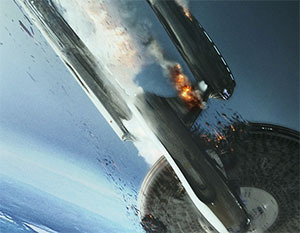
Star Trek: Into Darkness (Paramount)
Okay, right off I’m going to say the very first thing that came to mind when this movie was over:
“Thank the Great Bird of the Galaxy that I did not waste $28 to see this in a theatre.”
Yes, I easily resisted going to this movie when it hit the circuit, due to expectations that it would be a sloppy retelling of The Wrath of Khan, which wasn’t a great movie to begin with. But a colleague asked me to see the movie at some point, because he wanted to know my opinion of it, especially given my love of Star Trek and my opinion of Wrath of Khan. It just came available for rental on cable, so I’ve dutifully thrown away $6 and watched it with my wife.
So, without further ado, I am here to report that this Star Trek movie was ridiculous. Patently. Ridiculous.
At this point, I’d like to go on record saying that I believe J.J. Abrams is following a plan that I understand. We all witnessed this on Lost, in fact. Abrams likes stories that allow actors to react and emote to the best of their melodramatic ability, and he purposely sets up moments to allow them to do exactly that. I call them “pushbutton moments,” largely iconic and blatantly obvious actions for the actors to prove their talent against. Unfortunately, Abrams likes to do this at the expense of the story itself. He plugs in these pushbutton moments, whether they make any logical sense or not, in order to get the reaction shots he wants. Lost was chock-full of such moments, and chock-less of story sense along with them. STID was exactly the same. (Spoilers follow, because, frankly, this movie isn’t worth saving for anyone.)
The script (because I don’t want to actually refer to this as a “story”) built most of its pushbutton moments around the most incredible series of coincidences ever seen in the history of Mankind: Moments like Kirk’s out-thinking a roomful of Starfleet Command’s finest by deducing Khan’s intent to attack Starfleet’s commanders… mere seconds before a ship appears outside the window of the conference room and opens fire. And the hits keep coming and coming, right up to the last moments when Kirk, who has just died, is upstaged by a miraculously-revived tribble that provides a way to save him.
The script also made extensive use of “geek moments,” individual scenes or bits of dialogue that a hardcore Star Trek fan would recognize… for instance, a comment that recalls the character Harry Mudd from the original series, and a tribble that happens to be handy in the medical bay for McCoy to experiment with. Dialogue recycled from various past movies and TV episodes were also peppered in, creating in myself a noticeable wince whenever they occurred. I quickly lost track of the number of times I muttered to myself: “Don’t say it… don’t… oh, Christ, you said it…”
The movie managed to make a wonderful mockery of science—even Star Trek science. And that’s scary. From the very beginning, when Kirk and McCoy dove into an ocean and (apparently using jet boots) swam hundreds of meters deep in seconds, risking the bends at worst, and certain puncturing of their exposed eardrums at least, in order to reach an Enterprise that was submerged under the water. A spacecraft so huge that occupants require shuttles and transporters to get to the ground, but which can suddenly support its own weight, plus the weight of tons of water, and fly through the atmosphere as easily as a bird? Please.
The transporters turned out to be excellent plot complication devices, often operating in only one direction (and never the right one); we are presented with advanced torpedoes that can travel through star system distances… using fuel-based rockets; and the ship! Abrams has created a ridiculously humongous Enterprise, with ridiculously humongous open spaces throughout it, for two obvious reasons: One, because he believes Ridiculously Humongous equals Cool; and Two, because ridiculously humongous open space means he can blow ridiculously humongous holes in the hull, for the express purpose of sucking ridiculously humongous numbers of anonymous crewmen out into the void, kicking and screaming all the way. This ship is filled with more open spaces and fatal-plummet-sized sections than the interior of a Hyatt Regency, proving that Starfleet’s engineers are clearly no smarter than Abrams is.
And oh, yes: Apparently Abrams has decided that when a starship goes into warp, now it should leave a smoking trail behind… like it’s burning space-rubber.
But guess what? I haven’t even gotten to the best part yet.
STID is not a Star Trek movie.
To be honest, it’s not the first Star Trek movie that wasn’t a Star Trek movie. And this is its greatest failing, even beyond its nonsensical script, manufactured pushbutton scenery-chewing moments, botched science and insane design. But it’s certainly one of the least Star Trek of movies.
In one scene, Scotty tells Kirk, “I thought we were supposed to be explorers!” He’s right, too. Star Trek is about exploration, discovery, action guided by thought and discussion, and applying the best of human talents to solve problems. STID was all about death, destruction, revenge and punching their way through obstacles. Star Trek is about seasoned experts, where STID is about snot-nosed brats that ignore rules and mouth off to superior officers… and these people are given command of the newest, most powerful ship in Starfleet? IqnaH QaD.
Star Trek was a series about the human adventure in space. Its stories were so good that, even with bargain-basement special effects and cheesy monster costumes, the original series still shines through. Abrams’ movies have gone in exactly the opposite direction, giving us beautiful special effects and characters that are two-dimensional caricatures of their original selves, in exchange for cheesy stories. But then, Abrams himself has confessed that he never liked Star Trek as a kid. Well, that much was obvious in 2009.
So, to sum up: Star Trek Into Darkness sucked. Yes. It did. We can only hope and pray that any future Trek movies will do without the present creative team, because they don’t know what they’re doing—unless, of course, it really is their intention to drive the franchise into the ground for their new Star Wars bosses’ benefit.


September 21, 2013
Technology vs solitude
 On a recent episode of Conan O’Brien, comedian Louis C.K. discussed why he doesn’t want to give his daughters smartphones (I love discussions like this, especially when no one thinks to include asking whether the smartphone denier has his own smartphone). In a nutshell, Louis criticizes smartphones—really, phones in general—for allowing us to dodge moments of solitude or sadness, moments he feels we should embrace and celebrate. He believes our solitary moments are the most important to us, and should not be missed.
On a recent episode of Conan O’Brien, comedian Louis C.K. discussed why he doesn’t want to give his daughters smartphones (I love discussions like this, especially when no one thinks to include asking whether the smartphone denier has his own smartphone). In a nutshell, Louis criticizes smartphones—really, phones in general—for allowing us to dodge moments of solitude or sadness, moments he feels we should embrace and celebrate. He believes our solitary moments are the most important to us, and should not be missed.
Frankly, I’d expect that from a comedian whose most popular axiom is that everyone’s unhappy. Of course he wants people to stay unhappy… those are the kind of people he jokes about, and the kind of people who most appreciate his humor, so they are the people that keep him employed. But I’d say he’s dead wrong. Humans should not be alone or unhappy; neither should they celebrate unhappiness or solitude. That’s not being human.
Humans are social animals. We are at our best as a social entity… always have been. Being social protected us against predators, hunted for food while some of us took care of babies, passed on knowledge and shared with peers, and raised our species from just another aimless primate to Alpha Dog of all creatures on the planet. When we’ve had problems, we’ve discussed the problems with others to get help. When we’ve found solutions, we shared them so others could benefit from our insight.
Those are not the actions of solitary species. They’re not even the actions of Louis C.K. Does he tell his jokes to empty bathrooms? No: He gathers a few thousand people into a room, tells the jokes to them, and when they laugh, he gets money from them. Then he goes on television, where a few million people can watch him, and through a very social system in which advertisers pay for others to buy products based on watching Louis, he gets paid by another agency: The TV station. He is the living, literal embodiment of a social human. How could he possibly tell another human not to be social?
Solitude does have its uses. It’s good for reflection, for one thing, and it provides for a moment of rest. But Louis suggests we should cultivate those moments, like a solitary moment when a Springsteen song drove him to tears. I’d point out that, although those moments can be cleansing, they are also the moments that drive more people to suicide. Solitude clearly has limits to its value, and can make bad matters worse. (Go and find out exactly how social America’s last half-dozen mass shooters were. I’ll wait.)
The smartphone, central object of Louis’ comments (sort of), is a tool, a hallmark example of modern technology; so I see Louis’ comments as anti-technology, not just anti-smartphone. He sites people texting while driving—yes, an insane thing to do—as his primary reason why phones are bad for his daughters. But in doing so, he blithely ignores the good phones can do: Storing valuable information for instant access; helping to get directions or instructions when needed; summoning help in emergencies; providing knowledge or entertainment when a moment arises; and providing a way for others to find you when needed.
Personally, I’d say the many valuable things a phone can do clearly outweigh the few stupid things they can also do… and especially when possessed by people with more than 2 or 3 brain cells to rub together, who can be told not to do the stupid things. (I’d hope Louis’ kids are smart enough to be instructable. If not… well, Louis has problems other than technology to contend with.) I have a smartphone; yet I am smart enough not to text while driving. I also recognize the difference between a text or Facebook message and actual human contact, the former merely being a new degree of connectivity that Louis, at their age, didn’t have. He had phones in his house. But I bet his parents didn’t forbid him to use them.
This can be said about any tool and technological product: It can do good things, and it certainly can do bad things. A hammer can pound a nail, or crack a skull. But the potential to do bad things is not a good reason to abandon the technologies; it’s a good reason to learn to use them properly, to make an effort to make sure others use them properly, and—in cases when too many people use them improperly—to improve the technology to make it harder to use improperly.
To my mind, Louis’ comments (and many others I hear against one technology or another) really boil down to “I don’t like it, because it doesn’t make life perfect.” I’m pretty sure we, as a species, will never be perfect; but our greatest asset is that we continue to improve our world, and our technology, in a never-ending struggle to get that much closer to it.






